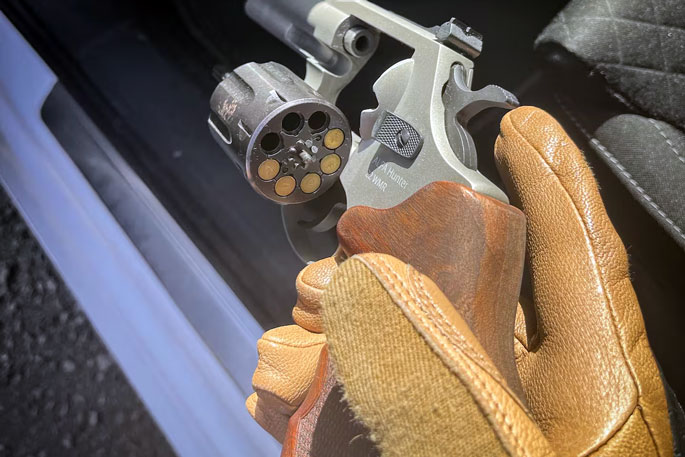
[ad_1]
Pawson said Parkinson was “remorseful and regretful” and wanted to “now get on with his life”.
Parkinson’s offending
Police said at the time charges were brought against Parkinson five Alfa carbine rifles were supplied to 31-year-old Trent Woodcock, who was allegedly an associate of the Comancheros gang.
However, that element of the offending was not accepted by Woodcock or Parkinson and was removed to reach resolution. It was not considered relevant to either man’s sentencing.
Parkinson admitted travelling to Auckland in June 2022 where he paid $10,488 in cash for the five rifles of varying calibres and $450 cash for parts from two Gun City stores.
While Parkinson himself held a firearms licence, he then passed them on to an unlicensed person.
But, the 49-year-old’s offending did not end there.
Four months later, he reported them stolen, claiming his entire gun safe, which was bolted to the floor of a shipping container on his Western Bay of Plenty property, had been ripped out.
Parkinson made an insurance claim for the stolen safe, five guns and 40 rounds of ammunition, which he was paid out for. But ESR analysis found the “new” safe he purchased was the “stolen” one, with analysis revealing it had never been ripped from the floor.
Parkinson had earlier pleaded guilty to charges that included unlawful possession of firearms, and obtaining pecuniary advantage, and was sentenced in Whakatāne District Court today.
After various discounts were applied for remorse, amends, previous good character, guilty plea, and background factors, he received an end sentence of nine months on home detention.
‘A misguided sense of loyalty’
Pawson’s written pre-sentence submissions to the judge detailed mitigating factors he said were at play.
They included Parkinson’s voluntary work, including sitting on local boards, coaching young rugby players, and mentoring troubled youth. There were references from people in the community confirming this, and his “otherwise good character”.
In terms of the offending, Parkinson told a probation report writer he was raised to help out his friends.
“At the time, [Parkinson] had a misguided sense of loyalty and made a poor choice in an attempt to help out a friend,” Pawson said in the written submissions.
“When he realised the seriousness of his actions, he panicked and made things worse by digging a bigger hole for himself… It is important to note the offending was not drug or gang-related.”
Parkinson had apologised to his community and rugby teammates during a recent reunion.
Matua Parkinson in his playing days. Photo / NZME
His attempts to make amends included repaying the insurance company and doing about 100 hours of voluntary community work.
Tramadol dependency and head injuries
A report from Community Mental Health at Tauranga Hospital outlined factors at play in Parkinson’s decision-making.
They included, “dependency on Tramadol and its cognitive side effects from high doses, his undiagnosed ADHD, and his emerging neurocognitive decline due to repeated head injuries”.
During a sentence indication hearing at the Tauranga District Court in mid-June, Judge Louis Bidois had questioned Parkinson’s behaviour.
“Who in their right mind is going to make an insurance claim for a stolen safe and then use the safe? Things aren’t going right for Mr Parkinson in his head, that’s for sure, something’s gone wrong.”
Pawson said at that hearing that Parkinson had played more than 700 games of rugby and quite a “large portion of those in the black jersey”, referring to his time in the Māori All Blacks.
“He’s taken quite a few knocks to the head over the years and this is clearly not a person who is thinking about what he’s doing.”
Judge Bidois said there clearly had been premeditation in Parkinson’s offending, as he had gone to Auckland with cash and purchased the rifles, quite deliberately, knowing the person he was going to pass them on to was unlicensed.
Pawson said Parkinson would not mind him saying that it was more “stupidity than sinister” and would “give the shirt off his back for anybody”.
The judge said that might be the case, but when dealing with firearms “in this day and age, the community takes a pretty harsh approach”.
“How many guns do you need, why would this other person want five guns and not one?”
Pawson replied the Alfa carbine was a “good pig hunting rifle”, and said the lower-calibre rifles were good for little more than farming.
The judge replied that “any gun is effective when it’s used in a hold-up or aggravated robbery”.
 A cut-down Alfa carbine seized by police during a different operation in April 2023. Photo / Police
A cut-down Alfa carbine seized by police during a different operation in April 2023. Photo / Police
The trouble with Alfa Carbines
Alfa carbines, available in 9mm, .357 and .22 calibres, are rifles that can easily cut down into handguns with a pistol-style grip and have a chambered cylinder, similar to a revolver.
They are prized in the criminal world because they do not eject shell casings when fired, leaving behind less evidence to a shooting crime.
In a statement given to NZME following today’s sentencing, Detective Inspector Albie Alexander said Parkinson’s offending put the public and police at risk.
“Parkinson has held high positions of responsibility in the community, including an elected health board official and being captain of the All Blacks Sevens. Alongside such roles, he was also required to meet the legal obligations to be a fit and proper person to hold a firearms licence,” Alexander said.
“Any diversion of lawfully purchased firearms to unlicensed people, potentially gang members, criminals or extremists, poses a significant safety threat to the public and to frontline police officers.”
Alexander said the National Organised Crime Group was aware of multiple examples of sawn-off Alfa carbine rifles being used to commit crimes, including homicides.
“More than 70% of firearms seized from offenders are standard rifles and shotguns, easily obtained by a so-called ‘A-Category’ licence holder,” he said.
“Today’s sentencing brings an end to court proceedings involving Parkinson, but the full impact of his offending is ongoing as the Alfa carbines he supplied to unlicensed people remain in circulation and are most likely in the hands of criminals.”
Parkinson’s “middle-man”
Parkinson’s co-defendant Trent Woodcock was sentenced in the Tauranga District Court earlier this month.
Crown prosecutor Laura Clay said while the Crown had removed any references to gang involvement from the agreed summary of facts, it was “a step too far” for Woodcock’s lawyer to say Woodcock had not involved himself in any “anti-social behaviours”.
“Mr Woodcock is still a patched member of the Comancheros. He was at the time, and still is,” Clay said.
However Woodcock, through his lawyer Paul Wicks KC, denied that as a factor of the offending.
“[The] offending pre-dated that particular aspect of Mr Woodcock’s involvement with that group,” Wicks said.
Wicks also said his client was remorseful, as indicated by pre-sentence and psychological reports, and was seeking help to address issues from his violent upbringing.
“He has reflected on his behaviour, his poor decision-making, and the potential consequences for himself and those around him,” Wicks said.
“He has now made pivotal choices about how he wants to live his life.”
Judge Bill Lawson told the 31-year-old that “any court is going to see this as serious offending”.
He said the offending had subverted and avoided the firearms laws.
“There is no doubt that the on-supply of firearms is a significant risk to the public,” Lawson said.
However, Lawson also noted that Woodcock was entitled to be treated similarly to co-defendant Parkinson, who had already been given a sentence indication.
The judge adopted a starting point for Woodcock of two years and nine months in prison before any discounts were applied.
The judge also addressed Woodcock’s gang association.
“You didn’t accept that being part of this offending and it’s not contained within the summary of facts. I put that to one side for the purposes of this sentencing exercise.”
The judge gave a total of 35% in discounts to account for his guilty plea, background factors and remorse.
He accepted the pre-sentence report recommendation that prison was not the best option for Woodcock’s rehabilitation.
He was someone who had good prospects of rehabilitation and was already receiving supervised treatment that the judge wanted to avoid interfering with.
Woodcock was sentenced to 10 months’ home detention.

[ad_2]
Copyright for syndicated content belongs to the linked Source link

